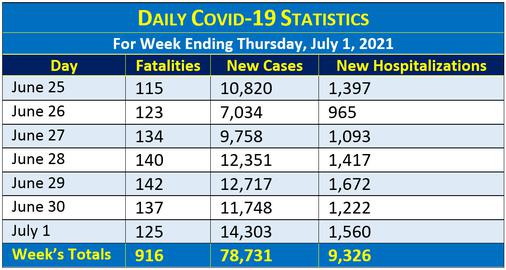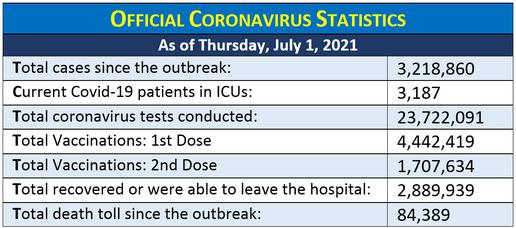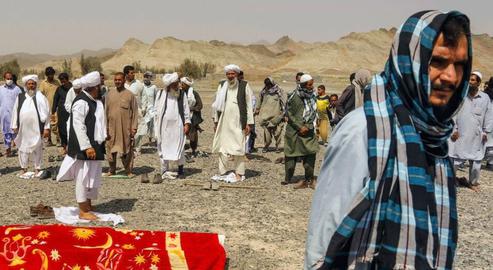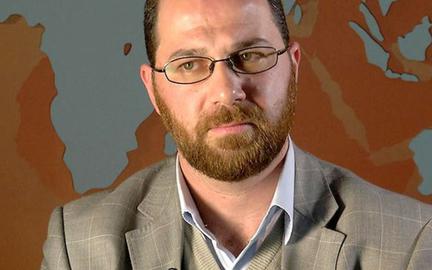The Delta variant of coronavirus, a hyper-infectious strain which was first detected in India, has spread across Iran. According to the health officials of the Islamic Republic, this is now driving a “fifth wave” of Covid-19.
From last month, when the first cases of this variant were identified in southern Iranian provinces, it would have been prudent to speed up vaccination efforts across Iran as a matter of priority. Instead, not only has the program practically ground to a halt, but the country’s eastern borders remain open.
Presidential election campaign rallies and the nationwide university entrance exams are almost certain to have contributed to the surge in new infections. At the same time, the summer heat wave has made it much more difficult for people to countenance wearing masks and other protective gear.
Iranian officials continue to make promises about various vaccines, both domestic and imported. But the total numbers of doses administered – first and second combined – remains a little over six million.
The Crisis in Sistan and Baluchistan
No other province has been as hard-hit by the Delta variant as Sistan and Baluchistan. The number of fatalities from Covid-19 in one day has reached 18, more than 1,000 new cases are being officially recorded every day and the daily number of outpatients and hospitalizations has surpassed the national average.
On June 30, warning that a “tsunami of death” was approaching Sistan and Baluchistan, provincial prosecutor Mehdi Shamsabadi asked Health Minister Saeed Namaki to contain travel to and from this province by enacting measures on the ground.
Journalists and civil activists have also been covering the crisis locally, with Hamshahri newspaper reporting the situation has forced “people in Sistan and Baluchistan to turn from searching for empty hospital beds to searching for empty graves… [The province] has gone beyond red alert and is now black.”
Hospitals in the province are at capacity, empty graves are not readily available and every day both the water and electricity are cut off for a few hours. In the three hospitals in the provincial capital, Zahedan, there have been no free beds for two weeks and as the provincial governor recently reported, 10 cities in Sistan and Baluchistan have no hospital whatsoever.
“The situation in Sistan and Baluchistan is a tragedy,” tweeted Navid Borhanzehi, a resident of the province. “Almost every 90 minutes coronavirus claims a victim, and each hour, 50 people test positive...Okay, we’ll stay at home, but in cities like Zahedan and Chabahar we have to go out to get water for cooking and drinking.”
According to Zahedan’s prosecutor, many people in the province do not believe in doctors and do not go to medical centers, meaning they succumb to the virus in their villages and are not included in the national statistics.
A shortage of test kits has made the situation worse. The journalist Sina Ghanbarpour recently warned that in the city of Saravan there is just one lab equipped to conduct the tests, which is now facing a backlog.
Finally on July 1, three weeks into the crisis, the Health Ministry sent a rapid-response team to the province to appraise the situation. Hossein Ali Shahriari, an MP for Zahedan, has blamed “mismanagement” for the spread of the Delta variant, telling reporters he had penned a letter to President Rouhani asking him to close the borders with Afghanistan and Pakistan.
The Health Ministry has confirmed the dominant coronavirus strain in Sistan and Baluchistan is the Delta variant. Back on May 15, Health Minister Saeed Namaki sent a letter to his Indian counterpart, in which announced that the Islamic Republic was ready to provide India with technical assistance, expertise and equipment to get the virus ybder control. But this variant has now been spreading in Iran’s southern provinces for the past four weeks and no action has been taken to control it. It has even been reported that Namaki is not returning the calls of the governor of Sistan and Baluchistan.
Empty Warnings
A number of cases of the Delta variant were confirmed weeks ago, but neither ordinary Iranians nor the government took it particularly seriously. In early June the Health Ministry put 16 cities, mostly in southern Iran, on red alert, increasing the number to 22 in the week ending June 18, the date of the presidential vote. The number of “red” cities is now back up to 63.
During this time the Health Ministry has repeatedly warned about the spread of SARS-CoV-2 variants in the five provinces of Bushehr, Kerman, Hormozgan, Sistan and Baluchistan and Yazd. But land, air and sea borders have remained open. Besides these five southern provinces, Tehran, South Khorasan, Khuzestan, Fars, Kohgiluyeh and Boyer-Ahmad, Golestan, Lorestan and Mazandaran currently have at least one red city each.
Of the 10 cities in Bushehr province, nine are on red alert. According to the deputy governor of Hormozgan, the situation in this province is critical as well.
The Fifth Wave
On June 30, Dr. Nader Tavakoli of the Tehran Coronavirus Taskforce announced the fifth wave of coronavirus infections in Iran had started. If this continues, he said, Tehran province would be set on red alert within the week. There are now 4,400 Covid-19 patients hospitalized in Tehran.
A doctor who works in a hospital in Tehran treating Covid-19 patients told IranWire the situation in the Iranian capital is “worrisome”: “In order to hold the presidential election, officials brought the situation back to ‘normal’ and this has led to an increase in hospitalizations.”
He added: “People’s approach towards this variant should be no different to the previous ones. Masks and social distancing are still the primary tools for containing infections. We know people are tired, and have had enough, but there is no other way. Without mincing words, I must say that the main culprit for the situation in Tehran and southern provinces is the government.”
Iran’s neighbor, Turkey, was able to lift all health-related restrictions on July 1 while Iran is getting ready to deal with the fifth wave of coronavirus. “The people of Turkey or other countries did not go abroad individually to buy vaccines!” the doctor said. “The government of Iran that is the first and the last culprit when it comes to each victim. They have allowed the Delta variant to march across the country in the past few weeks.”
The Turkish government has imported tens of millions doses of the Pfizer vaccine while Ali Khamenei, the Supreme Leader of the Islamic Republic, banned the importation of US- and UK-made vaccines in January.
Official Coronavirus Statistics
According to the official statistics announced daily by the health ministry, a total of 916 patients lost their lives to Covid-19 in the week ending July 1. With 142 deaths, June 29 had the highest number of fatalities for the week.

At the week’s end the health ministry announced that 63 Iranian cities were on red alert, 184 were orange and 201 were yellow. No city in Iran is currently on blue alert.

visit the accountability section
In this section of Iran Wire, you can contact the officials and launch your campaign for various problems



























comments